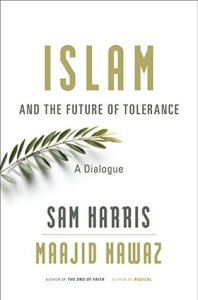Authors: Sam Harris and Maajid Nawaz
Type: Non-fiction, single subject
Full title: Islam and the Future of Tolerance: A Dialogue
Published: 2015
I read it: June 2017

I’ve been reading Sam Harris and listening to his Waking Up podcast for a while now, so I’m familiar with his thoughts on Islam. His concerns haven’t changed much over the years, because the issue of jihadist terrorism hasn’t seemed to improve much globally. But he has been trying different approaches to the conversation, and in this book decides to hold a dialogue with a liberal, democratic Muslim, Maajid Nawaz.
Nawaz is a public thinker and speaker on Muslim issues, and has a particularly relevant set of credentials. As a youth he was trained in the ranks of radical Islam. Some definitions from the book here are helpful: Islam is the religion, Islamism is the movement to impose a version of Islam on society (and is a form of theocratic extremism), jihadism is the use of force to spread Islamism, and jihadist terrorism is the use of force that targets civilians. It’s like the descending circles of theocratic hell. Anyway, Nawaz says that “I bear my fair share of responsibility for promoting the notion of a theocratic caliphate.” Now he is on the other side, trying to turn the tide in Muslim communities worldwide.
This book is a true dialogue about possible methods to bring Islam into modernity. It is definitely not an atheist vs. Muslim debate, and although Harris remains firm in many points he has raised in the past, he also does all he can to give Nawaz the space to outline his ideas. The reason the exchange is possible is because Nawaz agrees about the fundamental issue of the day:
We definitely have to acknowledge that anything we say could apply to Judaism and Christianity. But a particular strand of a politicized version of the Muslim faith is causing a disproportionate share of problems in the world, so there are good reasons to focus on that strand.
Both writers agree that although the violent jihadist groups must undoubtedly be stopped with military force, the long-term problem has to be solved by enacting a cultural shift that comes from within Muslim communities. Nawaz repeats again and again that only secular, democratic values can lead to the stable societies we want and need. He also doesn’t want to be clouded by those who think that only Muslims can speak on these topics: “We cannot disempower people who aren’t Muslims from discussing this, because everyone—the whole human race—has to deal with the implications of our failure to fix this question.” Islamism, as ugly and complex as it is, is everyone’s problem.(Apparently Nawaz was also the originator of the term “regressive left,” used to describe otherwise left-leaning people who tolerate illiberal principles under the guise of multiculturalism.)
The book is a mere 128 pages, quick and candid and a good starting point for diving into the modern quagmire. For the audio-inclined, Harris’ podcast has several interviews with people on this topic, such as “The End of the World According to ISIS” with journalist Graeme Wood, or “Leaving Islam” with Sarah Haider, in which she discusses the plight of ex-Muslims as well as thoughts on why Nawaz’s strategy of incremental reform may not work in time.
Advertisements Share this:




